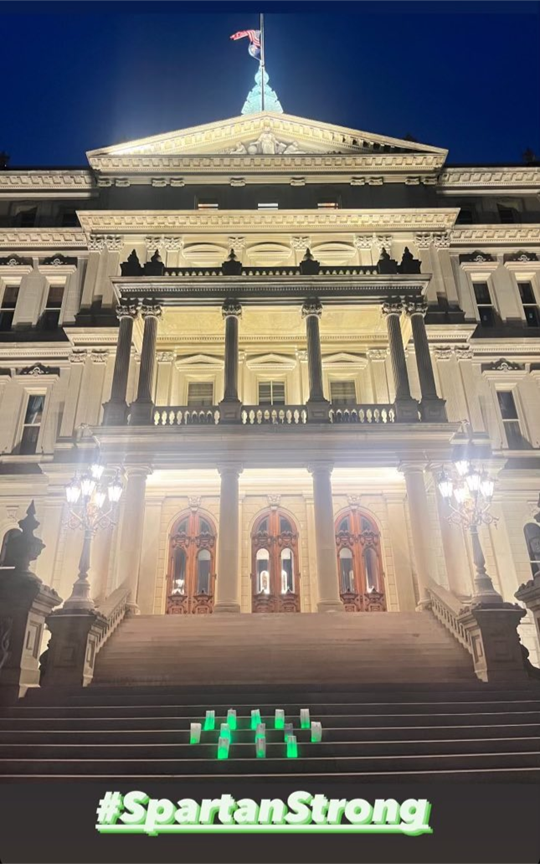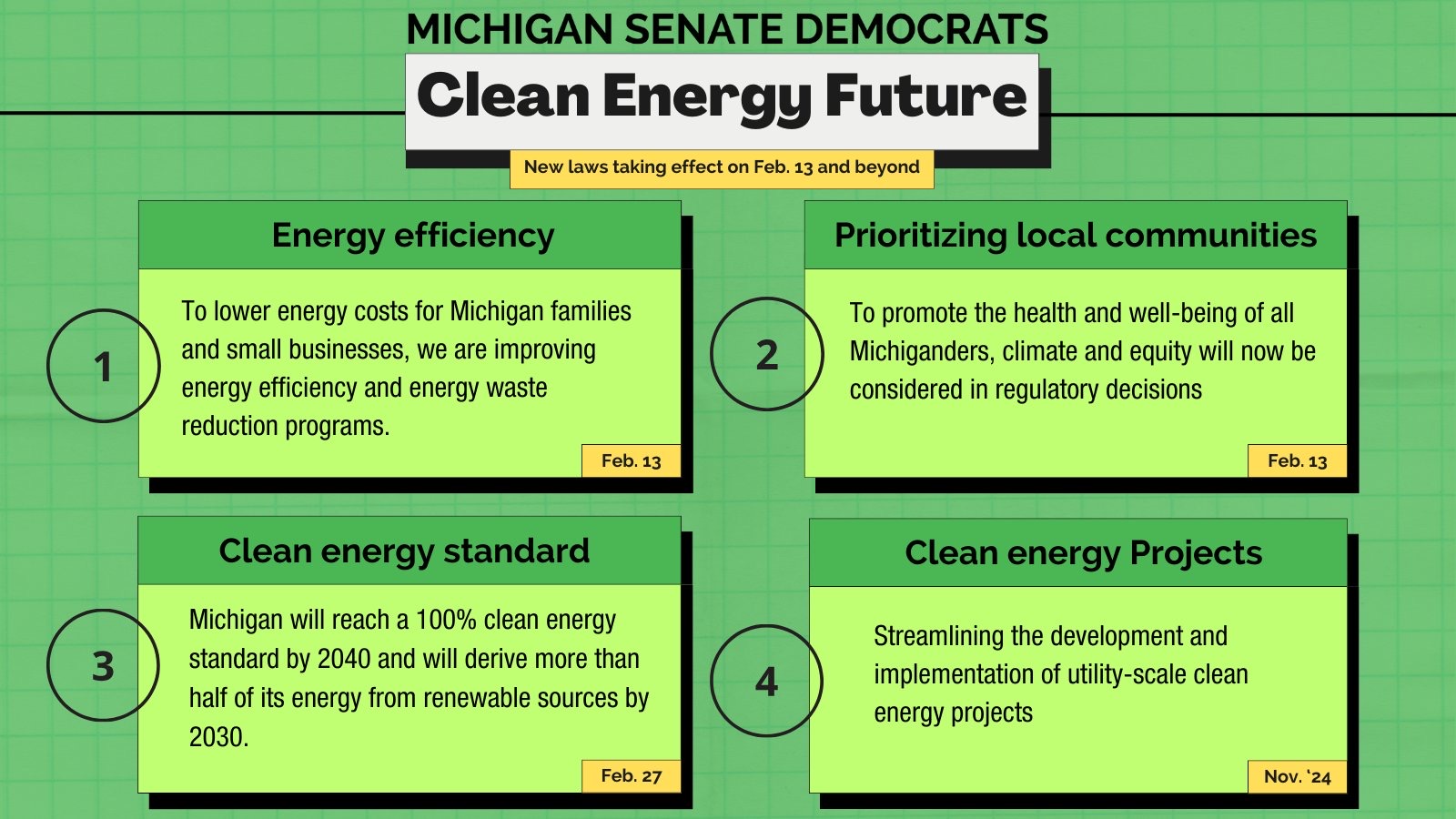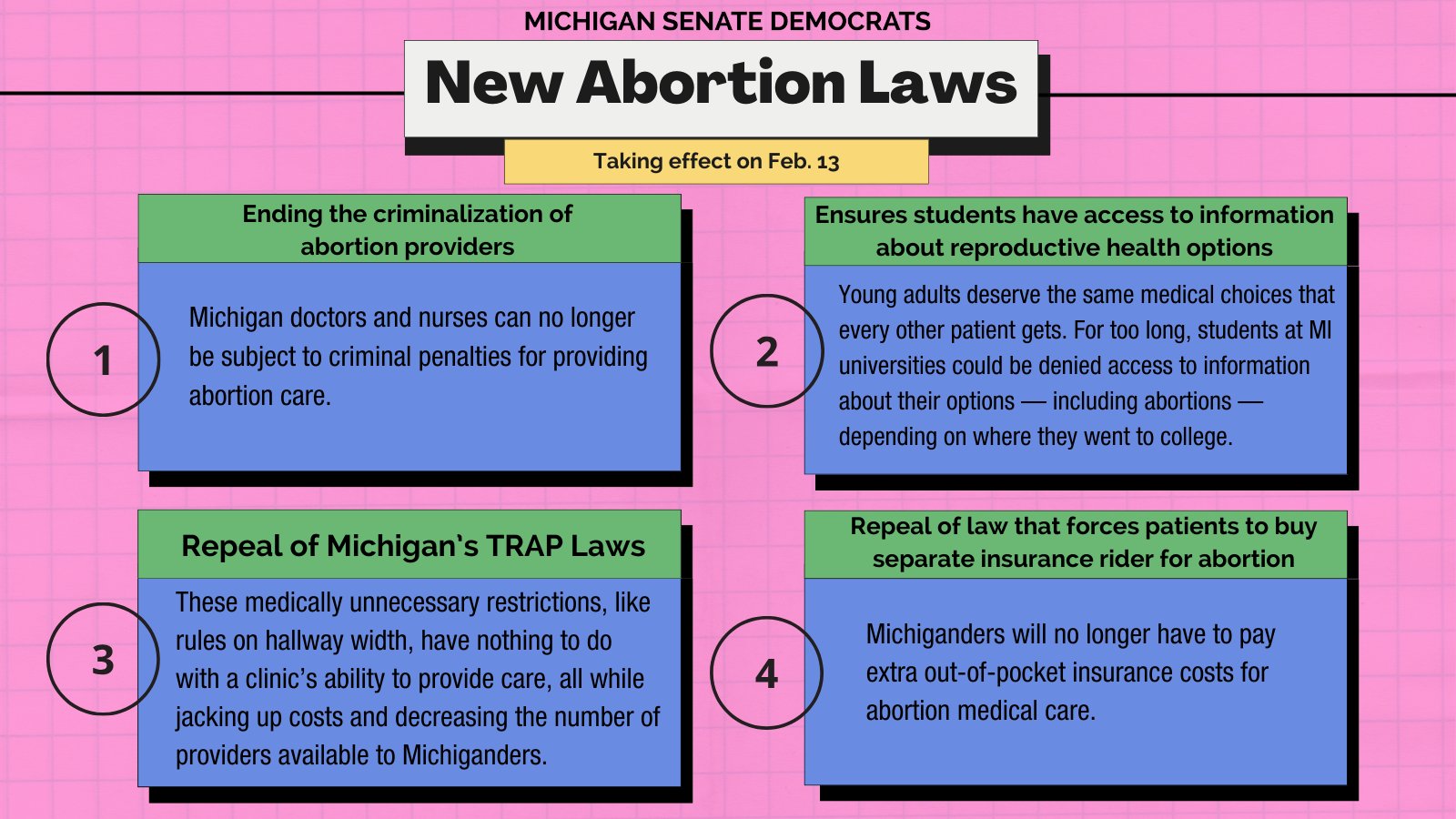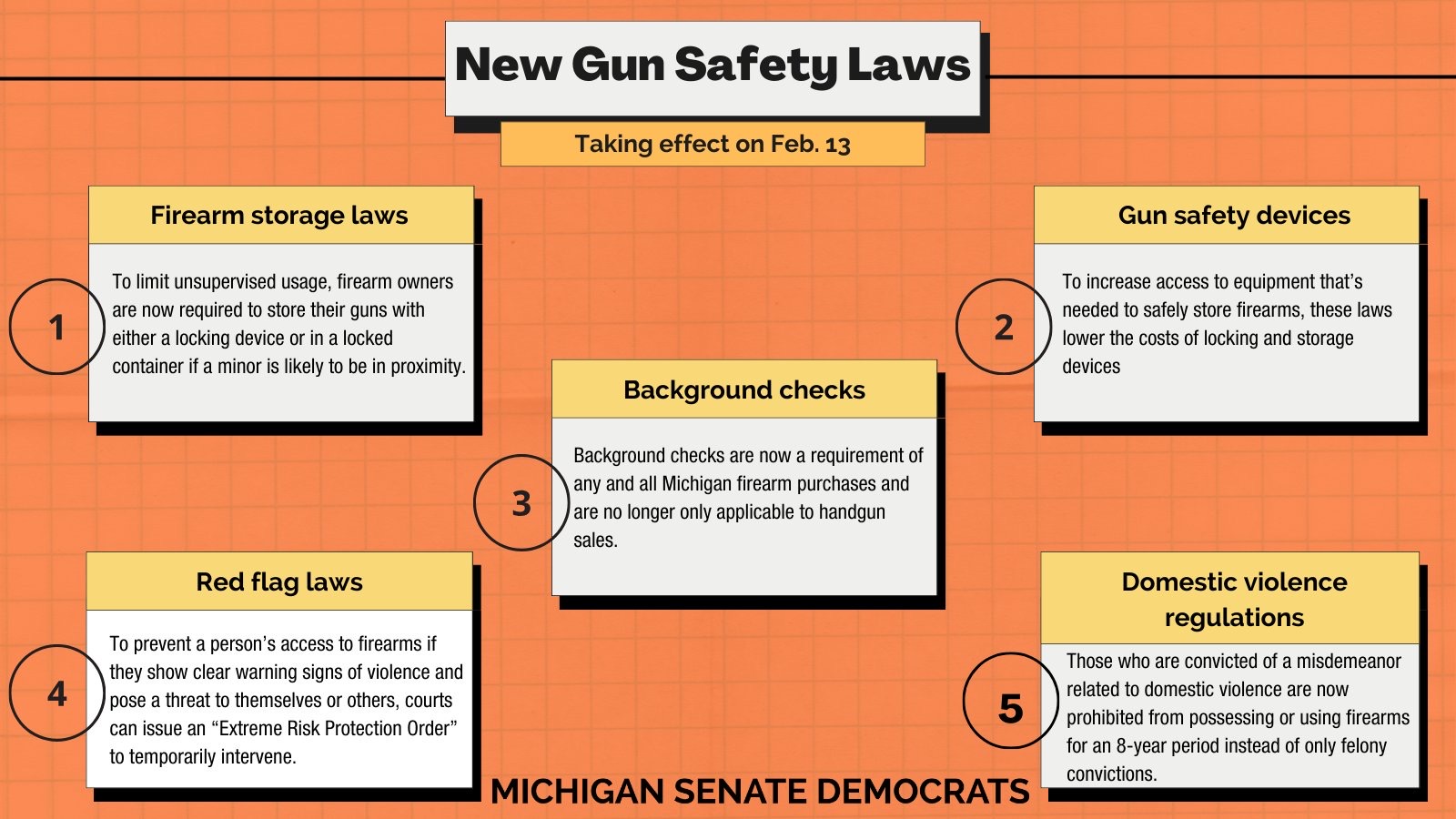Dear Neighbors,
There has been a lot happening in Lansing to better serve you as several important pieces of legislation took effect last week — including new gun violence prevention laws, tax relief for Michigan families and seniors, expansion of civil rights to LGBTQ+ residents, support for Michigan workers, reproductive health protections and clean energy legislation. In addition to these laws taking effect, Gov. Gretchen Whitmer recently presented her executive budget. Michigan Senate Democrats are looking forward to working with Gov. Whitmer to develop another state budget that continues to invest in our state’s most precious resource — our people.
Additionally, we are still celebrating Black History Month throughout February all while commemorating the accomplishments of African Americans as well as their pivotal contributions to the history of the United States. There are plenty of amazing ways to celebrate Black History Month in Michigan.
As always, I hope this newsletter informs you of all the exciting things happening in the Legislature and District 2.
Please do not hesitate to call my office at (517) 373-0990 or reply to this email if you have any questions, concerns, or need assistance.
Working for you,

Sylvia Santana
State Senator
District 2
Featured in This Newsletter
- Upcoming Events
- In Recent News
- Legislative Updates
- Resources
Upcoming Events
For the month of March, please join me at my upcoming coffee hours. At these events, I get to directly engage with you and answer any questions you may have about pending legislation. I hope to see you there! For more information, click here.
WHEN: Friday, March 8, 2024, 9:00 a.m. – 10:30 a.m.
WHERE: The Boys & Girls Club, 16500 Tireman, Detroit, MI 48828
WHEN: Friday, March 8, 2024, 11:30 a.m. – 1:00 p.m.
WHERE: Henry Ford Community College, 5101 Evergreen Road, Dearborn, MI 48128
In Recent News
Honoring Those Impacted by the MSU Tragedy

Last week marked the one-year anniversary of the tragic shooting incident on Michigan State University’s campus, which occurred on February 13, 2023.
On February 13, 2024, Michigan Senate Democrats joined together to honor the lives lost and forever impacted — whether by attending the MSU candlelight vigil ceremony on campus or placing green memorial luminaries on our Senate desks, in the windows of our Capitol office or at our homes.
Two days later, Michigan Senate Democrats supported students at the Capitol who rallied for commonsense gun safety legislation a year ago during a sit-down demonstration. What an honor it was to witness their resilience and unity. This simple yet powerful gesture served as a reminder of our shared humanity, and we stand united in our resolve to rebuke acts of violence and terror within our communities.
Clean Energy Future Legislation Creates Community & Worker Economic Transition Office
As part of our Clean Energy Future legislative package, signed into law last year, a new state office was created — the Community and Worker Economic Transition Office. The new office will develop proactive strategies and deploy resources to help companies and Michiganders take advantage of economic opportunities as the state shifts to high-tech advancements.
Housed in the Michigan Department of Labor and Economic Opportunity (LEO), this office will lead the development of a statewide plan for advancement into high-tech EV manufacturing and clean energy opportunities. It will help strengthen the state’s workforce by connecting workers to quality jobs and assisting employers in accessing resources for equipment upgrades and training to meet the demand in these sectors.
Michigan’s Economic Transition Office is the first in the nation to address shifts to renewable energy in both the utility and auto sectors.
Communities
The Economic Transition Office will continue working closely with community leaders and stakeholders to shape a dynamic, diverse economy. It will craft and implement strategies to tackle the key challenges across our state’s regions. Additionally, it will serve as a central resource hub for regional and federal information, offering technical assistance, capacity-building support and sharing best practices to help communities access resources effectively.
Workers
The Economic Transition Office will help workers on their path to these high-tech, high-pay jobs by increasing awareness of, and decreasing barriers to accessing resources, as well as partnering with community leaders to influence design of new programs that fill gaps. The office will collaborate with workforce partners, ensuring priority populations receive proactive outreach.
Employers
The office aims to boost Michigan’s economy and equity by prioritizing small and medium-sized businesses, women and minority-owned businesses, and those affected by manufacturing job losses. It supports businesses that offer good wages, decent benefits and fair treatment for workers.
To learn more about the Community & Worker Economic Transition Office and to sign up for updates, visit Michigan.gov/EconomicTransition.
EGLE Announces MI Recycling Grant Applications to Help Michigan Communities
As of February 12, 2024, the Michigan Department of Environment, Great Lakes, and Energy (EGLE) Recycling Unit is offering grants enabled by the Renew Michigan Fund for recycling infrastructure projects. The grant period is set to end on May 17, 2024.
The following types of entities are eligible to apply:
- Nonprofit organizations;
- Tribal governments;
- School districts, universities/colleges;
- Local health departments;
- Regional planning agencies;
- Cities, villages, townships, charter townships, counties;
- Municipal solid waste authorities; and
- Resource recovery authorities.
Michigan Senate Democrats prioritize supporting equitable, inclusive climate change priorities and greenhouse gas emissions reduction. In fiscal year 2024, EGLE will provide matching grants to increase access to recycling services and grow the statewide recycling rate.
Michigan Green Schools Application Open Through March 3
The Michigan Green Schools program is a fun, educational initiative that encourages students and faculty to participate in activities that are good for the environment and promote energy efficiency and savings. Any K-12 public or private school in the state may apply. Visit the Michigan Green Schools Hub to submit your application by midnight on March 3.
If you need assistance with your application, check out their tutorial video or reach out to the statewide coordinator, Eileen Boekestein, at BoekesteinE@michigan.gov. EGLE Classroom will also be hosting a MI Green Schools Helpdesk at the Michigan Science Teachers Association annual conference from March 1-2, 2024.
For more information, visit the Michigan Green Schools’ website here.
Celebrate Black History Month

Throughout the month of February, we honor the rich contributions and achievements of those within the African diaspora in our nation’s history. Join me and my Senate colleagues as we recognize the Black leaders, activists, artists and innovators who have shaped our society and continue to inspire us today. From the civil rights movement to the arts, sciences and beyond — their impact is immeasurable. During this month, let us engage in learning about Black history and promote equality and justice for all. To learn more about how the Michigan Senate Democrats have continued to embrace Black history and legacy, click here.
Michigan’s Presidential Primary Scheduled for February 27
After voters overwhelmingly supported Proposal 2 in 2022, Senate Democrats took action to codify the proposal into law — increasing access to cast a ballot and implementing safeguards to ensure Michigan elections remain fair, safe and secure. As a result, Michiganders will be able to more easily participate in the electoral process.
With Michigan’s Presidential Primary on February 27 fast approaching, here are a few key dates to be aware of:
- From February 17 to February 25, Michiganders looking to skip the long lines on Election Day can cast their ballot early. Find your nearest early vote location here.
- Through February 26 at 4:00 p.m., voters can obtain an absentee ballot at their local clerk’s office. The Secretary of State recommends hand-delivering an absentee ballot to your clerk’s office or a drop box if it is within 14 days of an election. Click here to find a drop box location near you.
- Through February 27 at 8:00 p.m., voters can register to vote in-person at their local clerk’s office. Verify your voter registration status and find your clerk’s office here.
- From 7:00 a.m. to 8:00 p.m. on February 27, voters can cast their ballot at their assigned polling location. Make sure to bring a photo identification card to the polls if you have one. Find your polling location here.
Earned Income Tax Credit Checks to Be Sent to Michigan Families in February 2024
On Tuesday, Feb. 12, Gov. Gretchen Whitmer announced that eligible Michigan families will begin receiving Working Families Tax Credit supplemental checks this week. The new checks are part of a $1 billion tax relief package signed into law last year that will help put an average of $550 back into the pockets of working families.
Please note the Department of Treasury will automatically process checks for Michiganders who submitted their 2022 tax return and confirmed eligibility for the additional state credit. Checks will be mailed on a rolling basis as soon as they are printed. It is estimated to take between five to six weeks to print and distribute all payments.
To qualify, individuals must meet certain requirements and file a federal income tax return, even if no tax is owed or there is no requirement to file a return. Eligible Michiganders do not need to submit any additional paperwork to receive the tax credit. However, if an individual has moved frequently or recently and has concerns about their address accuracy, Michiganders can manually update it here.
Legislative Updates
Legislation Ensuring Michigan’s Clean Energy Future Took Effect February 13
In 2023, Michigan Senate Democrats passed the Clean Energy Future plan in response to the escalating impact of climate change and the rising frequency of severe weather events and extreme temperatures in Michigan. The Clean Energy Future plan took effect last week — establishing clean energy and renewable energy standards, elevating energy efficiency targets, establishing a new Community and Worker Economic Transition Office and broadening the responsibilities of the Michigan Public Service Commission (MPSC).

These laws mark significant and historic progress toward a sustainable future for Michigan and lay a solid foundation for continued work to improve Michigan’s energy industry, while protecting our air, land and water. Read more here.
Legislation Ensuring Access to Reproductive Healthcare Goes into Effect
Nearly 2.5 million Michigan voters showed overwhelming support for Proposal 3 in November 2022 after the U.S. Supreme Court overturned Roe v. Wade. In November 2023, we took another bold step forward to ensure Michigan laws reflect Michigan values when Gov. Whitmer signed the Reproductive Health Act (RHA) into law. Now, we’ve taken another step forward as the RHA went into full effect last week.

This legislation was crafted with constituents and advocates in mind — taking into account their diverse lived experiences and perspectives.
New Gun Violence Prevention Laws to Protect Families Took Effect February 13
To help protect Michigan families — particularly children — from the tragedies of gun violence and unintentional firearms injuries, a law requiring secure storage of firearms took effect on Tuesday, February 13.
Under Public Act 17 of 2023, firearms must be locked and unloaded when unattended, particularly if minors are likely to be present. Failure to comply, as outlined in Public Act 16 of 2023, results in penalties, including misdemeanors and felonies, if minors gain access to improperly stored firearms.

These measures aim to address alarming statistics from the Centers for Disease Control, revealing that many unintentional firearm injuries among minors occur due to unlocked and loaded firearms, often stored in accessible areas like nightstands. Additionally, firearms are involved in over half of Michigan’s suicide deaths.
To ensure federally licensed firearms dealers communicate the new requirements to their customers, the Michigan Dept. of Health and Human Services (MDHHS) is working with the state Attorney General’s Office to provide dealers with safety information on the use and storage of firearms, requirements and penalties of the new laws and lethal means counseling literature.
To help defray the cost of purchasing firearm safety devices, additional legislation made these devices exempt from sales and use taxes through December 24, 2024. Free gun safety kits can also be obtained through Project ChildSafe law enforcement partners across the state. MDHHS is also working with the Michigan State Police to make gun locks available; additional details of this partnership will be announced soon.
Find more information on the new gun safety laws here.
Resources
Mental Health Resources for the Spartan Community
Last week marked the one-year anniversary of the tragic shooting on Michigan State University’s campus, which occurred on February 13, 2023. In the aftermath of this devastating event, many survivors, victims and their families — as well as MSU and the surrounding East Lansing community — still need support. As we all collectively grieve, I stand united with the MSU community in solidarity and healing.
For support resources, please go to the university’s Spartans Together website.
If you find yourself emotionally struggling or experiencing a mental health crisis, please be sure to utilize the following resources:
- Call or text the 988 Suicide & Crisis Lifeline. It is funded by the Substance Abuse and Mental Health Services Administration (SAMHSA) and administered by Vibrant Emotional Health. To learn more, click here.
- If you need mental health care, go to the MDHHS website for more information.
Call Michigan 2-1-1
Michigan 2-1-1 is a toll-free service that provides residents with information. Specialists trained to assist community members will connect you with the proper resources. From utility payment assistance to household needs, 2-1-1 is a great tool for you and your loved ones to use.
Though based in Lansing, MI, Michigan 2-1-1 supports about seven regions in the state of Michigan. You can text, email or call for help. For more information, click here.

